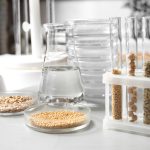SGS Crop Science News: July 2024
• Readiness for Winter Cereal Seed Sales
• Confirming Bacterial Leaf Streak In-Crop
• Using Molecular Lab Services when Field Pea Performance is Concerning
• Quantifying Weed Seeds in Topsoil and Compost
READINESS FOR WINTER CEREAL SEED SALES
Are you prepared for the upcoming sales of fall rye and winter wheat? Allow our accredited seed analysts to bolster your seed quality confidence! If you have stored clean seed from past crop seasons, consider scheduling your germination re-tests today. Within a span of 7-10 days, you’ll be well-positioned to confidently book orders for fall 2024 planting. While targeting an ideal plant population is standard practice, it becomes even more crucial for winter cereals which may experience higher mortality rates. Be sure to share the 1,000 kernel weight with your customers during seed pick-up; they will appreciate your proactive role in setting the stage for achieving targeted yields. Our team stands ready to assist you in shipping bagged and bulk seed to the USA. Don’t hesitate to contact us for your APHIS PPQ925/CFIA5289 Federal Noxious Weed Exam and documentation requirements. Germination testing is essential for farmers to ensure they are using viable seeds, thereby maximizing their crop potential.
CONFIRMING BACTERIAL LEAF STREAK IN-CROP
As we transition into summer, off a showery spring, crop disease becomes a prominent concern for producers. In addition to Fusarium, numerous leaf diseases flourish under moderate to severe precipitation. Empower yourself with knowledge about the emerging crop disease, bacterial leaf streak (BLS). Our pathology lab will assist you with identification! Should you notice symptoms akin to BLS (narrow, water-soaked streaks which turn from yellow to brown), promptly courier the symptomatic leaf tissue to our agricultural lab located in Sherwood Park. Within a matter of days, we will provide you the PCR results that either confirm or refute your field identification. Visit our website for Sample Submission Forms. Your proactive approach towards understanding crop disease makes a difference.
USING MOLECULAR LAB SERVICES WHEN FIELD PEA PERFORMANCE IS CONCERNING
Aphanomyces, colloquially known as root rot, is a formidable soil-born pathogen that poses significant threat to peas crops. The disease is instigated by the oomycete Aphanomyces euteiches, a microorganism that flourishes in moist soil. Notably, Fusarium species can also cause poor root structure and rotting, so PCR testing of the root tissue or soil will clearly distinguish between the two pathogens. Given the limited controls of the disease, learning the culprit disease will guide future management decisions such as crop rotation. Our laboratory services are proficient to test both pea root tissue and soil, with readiness to accurately and promptly answer your inquiries.
QUANTIFYING WEED SEEDS IN TOPSOIL AND COMPOST
Weeds compete with crops for nutrients, sunlight, and space, leading to reduced crop yields and concerns over infestations. By identifying the species and quantity of weed seeds present in the soil, reclamation companies can implement targeted and effective weed control strategies, preventing the spread of the seeds before they become difficult to manage and eliminate. Furthermore, certain weed species can host diseases that may harm crops, so early detection through soil testing can contribute to the overall plant health and productivity. A representative sample from the stock-pile is paramount to aid in a clear picture of weed seed presence.





